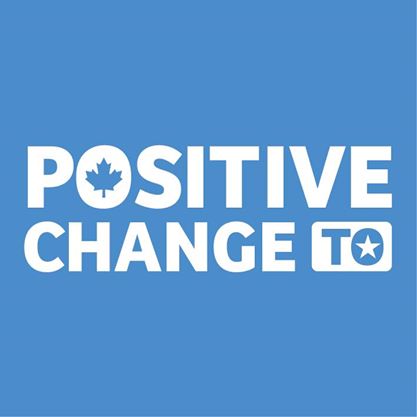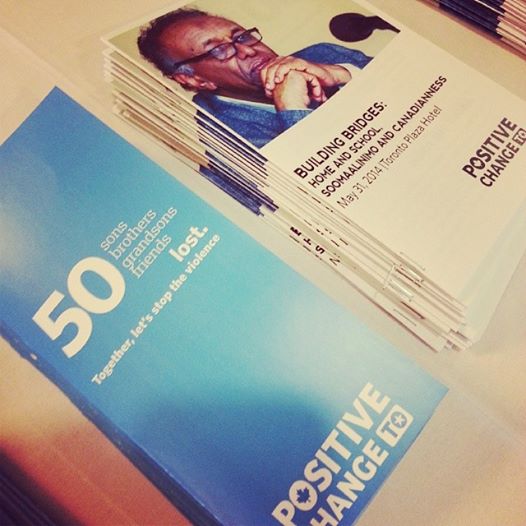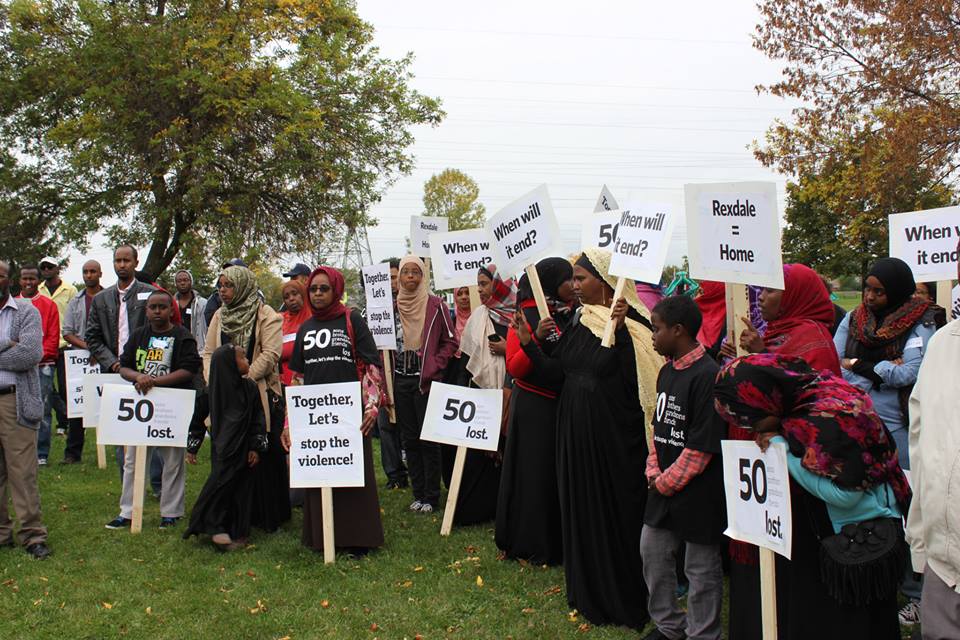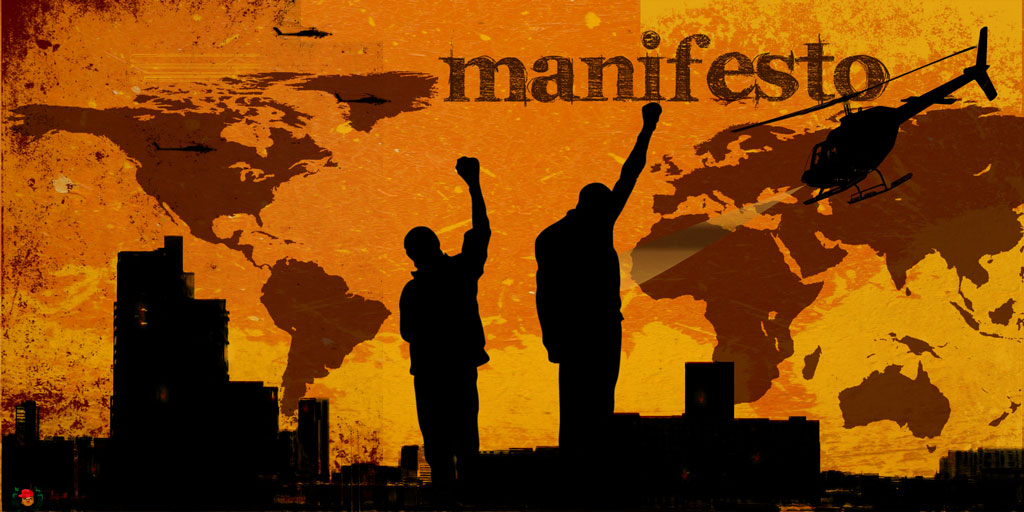Manifesto Presents: Seven Pillars - An Interview With Positive Change TO
 Sunday, June 1, 2014 at 7:34PM
Sunday, June 1, 2014 at 7:34PM 
In Toronto, one of Canada’s largest cities, there has
been a troubling epidemic that has affected the sizable
Somali community numbering almost 80,000 that
call it home. This epidemic of violence has taken the
lives of many of their young men. 50 to be exact.
And the mothers and other family members of the
slain have dealt with anguish in trying to find ways
to stop this violence with little to no assistance in
some respects from the police or government officials.
Two years ago, that anguish became fuel for a new
course of action. That action took shape and is now
Positive Change TO, an ad hoc advocacy group that
looks to chip away at the systemic issues that affect
the Somali-Canadian community in Toronto. Manifesto
had the chance to talk with Sagal Ali, one of the
many members of PCTO in April about Positive
Change and its work thus far.
Manifesto: Can you give us a quick overview of how
Positive Change was founded and it’s early beginnings?
PCTO: Sure. So in the summer of 2012, we saw a huge
spike in gun violence amongst Somali-Canadian
young men. We had six boys die in a matter of
weeks. To give you context, the year before there
weren’t any Somalis shot. So the community was
reeling from a shooting a week it seemed, and the
mothers especially felt really helpless. Their sons
were dying in the streets of Toronto but they didn’t
know what avenues they had to stop the violence
and keep their kids safe.
So a small group of Somali-Canadian mothers came
together and their intent really was just to raise
awareness of the violence. You know, our community
left a war-torn country and now kids are dying here.
They had enough. These incredible women came
together and began to speak out against the violence.
They took whistles - literally - and began protesting.
And an amazing thing happened - everyone listened.
Their goal was to get to the root of the problem: how
did we get here and what can we do to end the violence?
Manifesto: To date, what has been the response from the
Toronto educational system and the Toronto
Police Department and has it just been satisfactory
or progressively promising in your opinion?
PCTO: The response has been overwhelmingly positive.
Considering that we’re a volunteer-only group -
we’ve made amazing progress. So, if we were to
talk about policing first, we met with the police
division in an area that’s predominately Somali.
They, too, saw the problem but didn’t know much
about the Somali-Canadian community. After A
series of community consultations that we helped
facilitate, they actually created a Somali task force
which consists of two full time police officers
dedicated to the community. They would go and
talk to the kids, a little bit more of a positive
approach. And I think the task force now, I’d
have to double check, is up to four. And what the
task force has done is demystify the police force a
little bit. I think it created a bridge between the
community and the police. There was some hostility
going both ways. It’s been amazing with the police
and people who live in my neighborhood say they
feel safer and last summer wasn’t as bad as the
summer before.
Manifesto: Okay, good!
PCTO: And with education, we were approached by
the school board - well, we approached the
school board first saying we think there’s
serious gaps in the education system especially
when it comes to newcomer groups, and
especially the Somali community. They were
also really very receptive. It kind of seems like
they were just waiting for people to talk to
them - they didn’t have an organized group
approach them with a problem. So the board
put together a task force that we were sitting
on along with other community leaders. This
task force came up with a set of recommendations
to help Somali-Canadian young people thrive in
the school system. So it was quite an intensive
year. The recommendations were put forth and
were voted in. And now we’re at the stage where
we’re talking about implementation plans, which
is another positive story.
 Photo Credit: PositiveChangeTO
Photo Credit: PositiveChangeTO
Manifesto: How much of an impact have you seen in the
Somali-Canadian community in Toronto since Positive
Change was formed and with you working with
other groups, especially with who you’re reaching
out to, which are the youth at risk?
PCTO: Well, we don’t actually work with youth. Positive
Change’s mandate is not so much to be a service
provider. We don’t mentor youth because there’s
many, many other organizatons that could do that
much better than we ever could. Positive Change
really focuses on advocacy work on a societal level.
Doing what we’ve been doing with the school board,
with policing…we’re doing similar work with mental
health issues, working with the government and
other people who do provide these services. Our
impact is a little bit harder to define. We just feel
like there’s so many service providers and we already
have all these great relationships in the community.
But there’s nobody advocating for Somali-Canadians
on a higher level, on a decision-making level. We
went up to Ottawa to talk to members of Parliament
and they were like, ‘how come you guys never come
and talk to us?’ So we felt like that’s where the gap
was and just judging by the fact that we’ve never
had a negative reception ever, that to us means
there is a huge need and we were able to fill that. Photo Credit: Positive Change TO
Photo Credit: Positive Change TO
Manifesto: Okay, great. Thank you for fully delineating that,
that’s actually the springboard for my next
question. Just in terms of how the Somali-Canadian
community has been recieved by the government,
you would say that in light of the advocacy that
your group and other groups have brought to the
government’s attention that the response has been
overwhelmingly positive and accepting?
PCTO: Well, I think there’s a difference between positive response
and action, right? We’re dealing with a conservative government
right now, and their stance on crime is different than ours.
We’ve had a lot of healthy debate with decision makers and
they’ve always been respectful, but there hasn’t been any
real concrete changes made on a national level. And I say
national because although there’s a lot of problems happening
in Toronto, there’s also a large Somali Community in Alberta
and they’re also experiencing many of the same issues we’re
experiencing here. We meet and speak with politicians all the
time and they say, ‘yeah this is something that really needs
to change.’ But that’s where the conversation ends. And it’s
been frustrating but really all we can do is keep putting pressure
on the government and if that doesn’t work out, come election
time, mobilize people to vote for people who will make change
happen.
Manifesto: Has Positive Change had an eye to the future in
in terms of joining coalition forces with other groups
nationwide in Canada and also reaching out to those
Somali groups in the US that are dealing with this
issue as well?
PCTO: We’re always open to work with people, but at this point
it wouldn’t necessarily be a coaltion. It would be on an
event basis, a campaign basis. Speaking about our event
that was in Ottawa, that was in November when we went
up there - the Somali community in Ottawa was
incredible. They essentially opened up there homes to
us and a lot of us stayed with people that we never met
before. And we were partnered up with a lot of amazing
organizations working out of Ottawa. So, I see Positive
Change reaching out to organizations in Ottawa, Alberta
or even Minnesota which is where we have a big Somali
population as well on a case by case basis. We’re quite
young…it’s kind of crazy because it feels like we’ve been
doing our work for so long but it’s only been less than two
years now. So, I don’t know what the future holds. But
we’re just going to soldier on and whoever wants to
help along the way, we’re happy for the support.
Manifesto: This is obviously a very emotional and personal cause
to advocate for. What has been the sources of strength
for you and others in Positive Change to keep fighting
for resolutions and change in the midst of having
obviously full lives as individuals?
PCTO: That’s a really good question. People ask me that a lot,
because I have a full-time job, a part-time job and I
do this. But, I don’t think anybody in the group enjoys
the work that we do. I think it’s difficult to enjoy. But
I think we all feel like we don’t have a choice. And if
we don’t do the work, who will? And I think people
in general are like, ‘yeah that’s horrible’ and ‘that’s
such a big problem’, but few people are willing to put
in the work. And we have an amazing group of people
who are dedicated volunteers. A lot of them, in addition
to having jobs, have families. I can’t imagine how they
make the time. But I feel like this is something we
have to do and if we don’t, then this is just the beginning
of a huge, huge problem. And we all have our personal
stories that have brought us to the group, as you know
I’ve lost my cousin…my cousin’s mom who’s been one
of our leaders, she’s been there every week. This is a
woman who’s in her 60’s who’s lost a son, has a full
time job, still has children at home…and if she can be
there every week, there’s no reason why I can’t be
there either.
Manifesto: Lastly, what do you hope to see Positive Change
accomplish for the rest of 2014?
PCTO: I hope that we keep the momentum up. I hope that
we…we’re always afraid of summer. Summer is when
the gun violence always spikes. So we’re all a little
bit nervous about the summer and we hope that
through our continued effort, on school board level
especially since that’s we’re focusing on now, if we
can work with the school board and work on
implementing those recommendations I talked about
earlier, maybe we can start seeing some of those in
the next school year starting in September, that
will be a huge, huge success. And if…you know, we
can’t really prevent crime. But by being out there,
if someone thinks twice about doing something stupid,
then we’ll have been successful.
For more information about Positive Change Toronto,
visit their website and check them out on Facebook
as well as Twitter.


